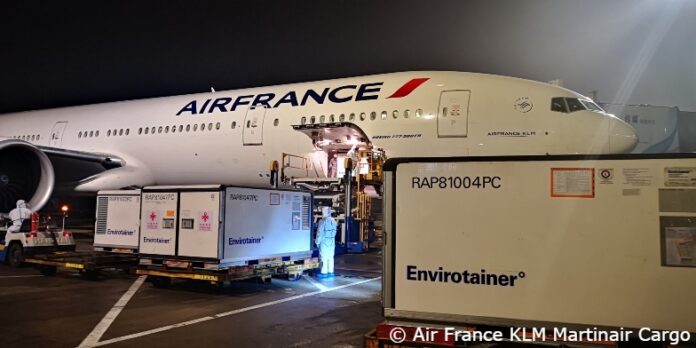Major European airlines are among those helping UNICEF in its historic mission to deliver COVID-19 vaccines, essential medicines and medical devices across the globe in response to the coronavirus pandemic.
Brussels Airlines, Lufthansa Cargo, Air France KLM Martinair Cargo and Cargolux are among the 10 airlines that have joined the Humanitarian Airfreight Initiative, which will deliver critical supplies to over 100 countries.
The initiative is in support of the COVAX Facility, the largest vaccine procurement and supply operation ever undertaken aimed at providing COVID-19 vaccines to all countries across the world, regardless of their wealth.
Co-led by the Coalition for Epidemic Preparedness Innovations (CEPI), Gavi the Vaccine Alliance and the World Health Organization, alongside delivery partner UNICEF, COVAX is working to provide 2 billion doses of the COVID-19 vaccine by the end of 2021.
“Delivery of these life-saving vaccines is a monumental and complex undertaking, considering the sheer volumes that need to be transported, the cold chain requirements, the number of expected deliveries and the diversity of routes”, said Etleva Kadilli, Director of UNICEF Supply Division. “We are grateful to these airlines for joining forces with the UNICEF Humanitarian Airfreight Initiative to support the roll-out of COVID-19 vaccines.”
Saving human lives
Franco-Dutch airline Air France KLM Martinair Cargo, which has worked with UNICEF on previous vaccination programmes, will transport vaccines and related supplies, such as syringes and needles, to destinations in Africa, Asia, the Middle East and Latin America.

“We consider it our responsibility as an airline to support the distribution of these vaccines worldwide. This is really about saving human lives”, said Marcel Kuijn, Global Head of Pharmaceutical Logistics at Air France KLM Martinair Cargo, in an interview with UNRIC. The airline has so far flown millions of doses of vaccines to destinations including Jakarta in Indonesia, Bamako in Mali, and Lomé in Togo.
Brussels Airlines, a subsidiary of the German Lufthansa Group, is also taking part in the campaign thanks to the airline’s elaborate network in Africa. It is shipping vaccines and medical equipment to 16 countries in Sub-Saharan Africa and has so far transported 130,000 vaccines to Banjul in The Gambia, Freetown in Sierra Leone and Monrovia in Liberia. Two shipments with sterilised and disposable syringes were delivered to Abidjan in Côte d’Ivoire.
“It is a real honour for Brussels Airlines to contribute to the COVAX initiative (…) We can contribute to the global vaccination campaign, which is an extremely important challenge that we all face together”, said Brussels Airlines Spokeswoman Maaike Andries.
Cargolux, a Luxembourgish cargo airline that regularly provides transport solutions for medical shipments, said taking part in such initiatives “fully aligned with the airline’s values”. “It was therefore natural for us to take part in this project”, said Cargolux President & CEO Richard Forson in a press statement.
Logistical challenges
The initial 2 billion doses of vaccines delivered through the COVAX initiative are intended to protect frontline health care and social workers, as well as high risk and vulnerable people. Shipments are expected to increase as the production of COVID-19 vaccines is ramped up.
For the airlines involved in the initiative, distributing vaccines poses specific challenges in terms of volume, transportation requirements and security.
“Depending on the manufacturer, the different COVID-19 vaccines must be stored and transported at a certain temperature. This varies between -80 degrees Celsius and plus 8 degrees Celsius”, explained Mr Kuijn. Air France KLM Martinair Cargo’s hubs at Charles de Gaulle near Paris and Schiphol Airport near Amsterdam are fully equipped with climate-controlled facilities to carefully store any vaccine shipments in transit before being transported.
Global public good
Based on the COVAX Facility’s indicative distribution and first-round allocation plan, 145 countries are expected to receive doses to immunise around three per cent of their population in the first half of 2021.
For United Nations Secretary-General António Guterres, ensuring equal access to vaccines across the world is key to defeating the pandemic.
“Vaccine equity is ultimately about human rights (…) Vaccines must be a global public good, accessible, and affordable for all”, he concluded.




